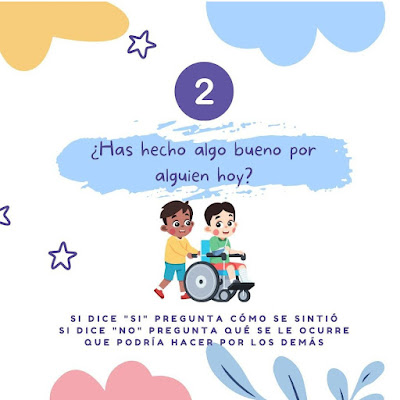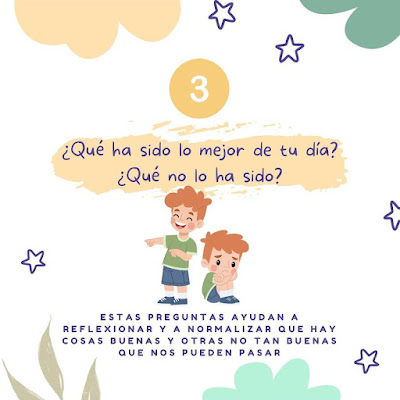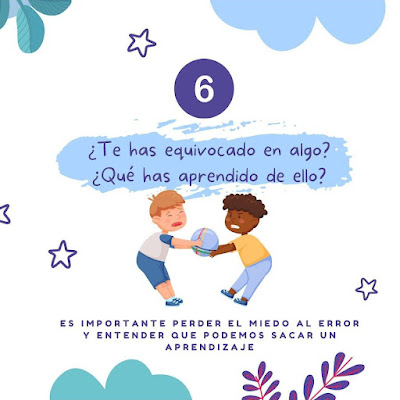COMO MEJORAR LA COMUNICACIÓN
EN LOS NIÑOS
HOW TO IMPROVE COMMUNICATION
IN KIDS
EDITORIAL ESPAÑOL
==================
La comunicación con los niños es fundamental para su desarrollo, tanto
en el ámbito familiar, escolar y social. Te presento a
continuación alguna sugerencias que te va a ayudar a mejorar la
comunicación con tu hijo sea niño o adolescente:
1.) No hacer preguntas repetitivas como el clásico: como te
fue en el colegio hoy ?, porque hay que evitar la monotonía, preguntar
siempre los mismo provocará respuestas automáticas, y si el niño
tuvo un "mal" día en el cole, escucharas siempre la misma
respuesta.
2.) Prestar atención a lo que está diciendo el niño
cuando hables con él, y demostrar interés en sus
pensamientos y sentimientos, puede que te esté diciendo algo
importante y si no prestas atención provocaras el
retraimiento, distracción y quizá en una próxima vez
no te comunique "eso" que ya
anteriormente quiso decirte.
3.) Utilizar un lenguaje sencillo, hablando con
claridad: hay que utilizar palabras sencillas adaptadas a la edad
del niño o adolescente para que pueda entender lo que
le estás comunicando, y no utilizar palabras rebuscadas
y difíciles de entender.
4.) Conectarnos con el mundo interior del niño: para ellos hay dejarlos expresar sus sentimientos y
emociones y hacerles preguntas indagatorias como:
si tuvieras un súper poder que harías, o que te gustaría hacer ?, la respuesta seguro que te
dejara asombrado(a) y te ayudará a conectarte con su
mundo,
5.) No utilizar amenazas o castigos: para lograr
algún objetivo con el niño, el chantaje con caramelos,
pantallas, tv, móviles, juguetes, no es una
buena alternativa y de hecho es muy utilizada hoy
día.
6.) Aprender a identificar y expresar sus
emociones, para ello debes animarte a hablar con ellos y
preguntarles cómo se sienten, preguntarles si hicieron
algo bueno en el día, y dependiendo de la respuesta
animar a hablar sobre ese tema.
7.) Priorizar lo que mejor o peor que le ocurrió en el día, mediante preguntas sencillas,
sin criticar o juzgar al niño, ello te ayudará a
comprender el entorno del niño, y explicarle que hay situaciones buenas, otras no tan buenas, que
pueden suceder a diario, además podrás entender si
está ocurriendo algo inadecuado en el cole, porque
los niños normalmente expresan sinceramente como esta el
entorno, pero si hay castigo y crítica, no los oirás decir
que está pasando.
8.) Leerles en voz alta y clara, cuentos y
relatos: cosa que ayudará a mejorar el vocabulario
del niño, la comprensión, y reflexión y aprender
nuevas palabras.
9.) Hacer juegos de roles: padres-hijos o
con otros niños, lo cual constituye una forma
divertida para que los niños se expresen,
corregir palabras, incluir palabras nuevas,
darles oportunidad de hablar por turnos, escucharlos
atentamente, para que sientan que son atendidos. Esto
es vital en la comunicación, que el niño sienta que es
tomado en cuenta al hablar.
10.) Preguntas indagatorias sutiles:
como:
- Si pudieras cambiar algo que
sería ?
Podemos descubrir si algo les preocupa y
mostrarles nuestro apoyo.
- Si te concedieran un deseo cual
seria ?
Esta pregunta ayuda a conocer sus deseos y
sueños.
- Te has equivocado en algo ?
aprendiste algo de ello ? Hay que enseñarles a perder miedo al error
para que saquen conclusiones efectivas y se
produzca un aprendizaje de ellos.
11.) Mostrarles cómo deben
comunicarse:
tanto con adultos, niños, maestros y entorno
social en general. Enseñarles a valorar
las situaciones buenas, el agradecimiento y
el buen comportamiento.
Todo lo dicho acá no se logra en un
solo día, es una labor diaria, en
todo momento sin presiones, castigos,
amenazas y chantajes, en
resumen, para mejorar la comunicación en
los niños debes ser un buen padre y
dedicarte a ellos que son el futuro de la
humanidad.
La falta de comunicación en un niño puede
ser un indicio de que algo está
sucediendo, y podría tratarse de un
Síndrome de espectro Autista. o
1.) TDAH (trastorno del déficit de
Atención e Hiperactividad, (aquí los
links)
EDITORIAL ENGLISH
=====================
Communication with children is
essential for their
development, both in the
family, school and social
environment. Below I present
some suggestions that will
help you improve communication
with your child, whether child
or adolescent:
1.) Do not ask repetitive
questions like the
classic:
how was school today?,
because you have to avoid
monotony, always asking the
same questions will provoke
automatic responses, and if
the child had a "bad" day at
school, you will listen.
always the same answer.
2.) Pay attention to
what the child is saying
when you talk to him
, and show interest in his
thoughts and feelings, he
may be telling you
something important and if
you do not pay attention
you will cause withdrawal,
distraction and perhaps
not the next time. He
communicates to you "that"
that he previously wanted
to tell you.
3.) Use simple
language, speaking
clearly:
you must use simple
words adapted to the age
of the child or
adolescent so that he or
she can understand what
you are communicating,
and not use fancy words
that are difficult to
understand.
4.) Connect with the
child's inner world:
for them we have to
let them express their
feelings and emotions
and ask them probing
questions such as: if
you had a super power,
what would you do, or
what would you like to
do? The answer will
surely leave you
amazed (a ) and will
help you connect with
their world,
5.) Do not use
threats or
punishments:
to achieve some
objective with the
child, blackmail
with candy, screens,
TV, cell phones,
toys, is not a good
alternative and in
fact is widely used
today.
6.) Learn to
identify and
express their
emotions,
to do this you
must encourage
yourself to talk
to them and ask
them how they
feel, ask them if
they did something
good that day, and
depending on the
answer, encourage
them to talk about
that topic.
7.) Prioritize
what happened
best or worst
that day,
through simple
questions,
without
criticizing or
judging the
child, this will
help you
understand the
child's
environment, and
explain to him
that there are
good situations,
others not so
good, that They
can happen every
day, and you
will also be
able to
understand if
something
inappropriate is
happening at
school, because
children
normally express
honestly how the
environment is,
but if there is
punishment and
criticism, you
will not hear
them say what is
happening.
8.) Read
tales and
stories to
them aloud
and clearly:
this will help
improve the
child's
vocabulary,
comprehension,
and reflection
and learn new
words.
9.) Play
role
games:
parents-children
or with
other
children,
which is a
fun way for
children to
express
themselves,
correct
words,
include new
words, give
them the
opportunity
to speak in
turns,
listen
carefully,
so that they
feel that
Are served.
This is
vital in
communication,
that the
child feels
that he is
taken into
account when
speaking.
10.)
Subtle
probing
questions:
such as:
- If
you
could
change
something
what
would
it
be?
We can
find
out if
something
is
worrying
them
and
show
our
support.
-If
you
were
granted
one
wish,
what
would
it
be?
This
question
helps
you
know
your
desires
and
dreams.
-
Have
you
made
a
mistake
about
something?
-
Did
you
learn
anything
from
it?
They
must
be
taught
to
lose
fear
of
error
so
that
they
can
draw
effective
conclusions
and
learn
from
them.
-
Have
you
made
a
mistake
about
something?
Did
you
learn
anything
from
it?
They
must
be
taught
to
lose
fear
of
error
so
that
they
can
draw
effective
conclusions
and
learn
from
them.
11.)
Show
them
how
they
should
communicate:
with
adults,
children,
teachers
and
the
social
environment
in
general.
Teach
them
to
value
good
situations,
gratitude
and
good
behavior.
Everything
said
here
cannot
be
achieved
in
a
single
day,
it
is
a
daily
task,
at
all
times
without
pressure,
punishment,
threats
and
blackmail,
in
short,
to
improve
communication
in
children
you
must
be
a
good
father
and
dedicate
yourself
to
them,
who
are
The
future
of
humanity.
Lack
of
communication
in
a
child
can
be
an
indication
that
something
is
happening,
and
it
could
be
Autism
Spectrum
Syndrome.
or
1.)
ADHD
(Attention
Deficit
Hyperactivity
Disorder,
(here
the
links)





















